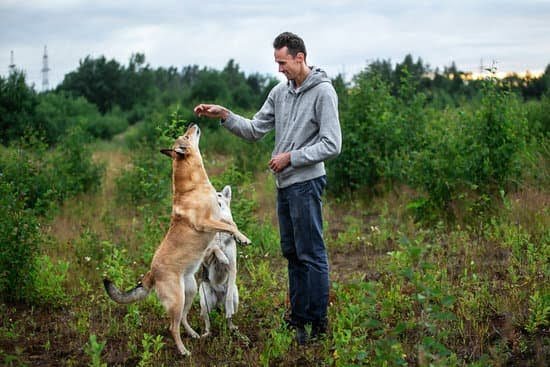Introducing Service Dogs
Service dogs are a special type of dog that is trained to assist and provide important services for people with disabilities. The history of service dogs goes back centuries, having played a crucial role in many disabled people’s lives right up until the present day. They are usually Labrador Retrievers, Golden Retrievers, German Shepherds, or other breeds specifically chosen for their natural work drive and intelligence as well as their even-tempered personalities. Service dogs have received training since they were puppies and are capable of providing a variety of skills, from helping those with physical impairments to aiding those who suffer from psychiatric conditions like post-traumatic stress disorder (PTSD).
Training a service dog is often done by professional trainers or organizations specializing in the development of service dogs. Of the various tasks that service dogs perform for those with disabilities, some can only be learned through specialized training such as how to open doors, turn on light switches, respond to certain medical crises such as diabetes or seizures and provide emotional support during panic attacks etc. Other behaviors may not require formal instruction but are fine-tuned through practice and repetition until desired results are achieved. Some organizations even have certified trainers who specialize in teaching advanced skills like retrievals and obstacle navigation which require complicated cues. Professional obedience classes also help maintain the dog’s safety in public areas so they do not become disruptive while at work. Therefore, both professional trainers and organizations play an essential role in developing highly trained service dogs capable of providing individuals with disabilities increased independence and support.
Variety of Service Dogs & Uses
A service dog is an animal expertly trained to perform tasks that assist and support people with disabilities. Different organizations train these dogs for different purposes and the training process varies depending on the type of service dog. Task-trained dogs are trained to complete tasks like pulling wheelchairs, retrieving items, or providing balance support for individuals with mobility limitations. Emotionally-trained dogs help ease anxiety in people living with mental health conditions. Facility-trained dogs provide comfort to people in group settings such as hospitals, schools and prisons. They may take part in pet therapy sessions, as well as rehabilitation programs for inmates. Psychiatric support dogs are also trained to provide assistance for people with autism spectrum disorder, post-traumatic stress disorder, attention deficit/hyperactivity disorder (ADHD), traumatic brain injury (TBI) and other psychological challenges. To make sure each service dog is effective, the animal should be professionally handled by a reputable organization specializing in specific types of service dogs. The organization should be able to explain the process of educating a service dog and can offer long-term aftercare services like annual check-ups and private lessons with a certified trainer.
Qualifications of Potential Trainers
Service dog trainers must be highly qualified and experienced in providing animal training. Potential trainers should have a comprehensive knowledge of service dog tasks, as well as experience training these complex animals to perform them. They should be able to effectively communicate and clearly articulate instructions to the service dog. In addition, they should have a strong understanding of canine behaviors and be comfortable teaching the use of positive reinforcement methods in place of punishment-based methods. As this may require a large time commitment on their part, potential trainers need to make sure they can meet the demands of training both in their professional facility and in home visits. The trainers must also understand how to properly handle challenging behaviour that may manifest in service dogs, such as fearfulness or aggression. Finally, potential trainers must stay up-to-date with service dog laws and regulations to ensure ethical standards are met at all times.
Stages of the Training Process
Service dogs are highly trained animals that help provide assistance to people with physical, mental, emotional and/or cognitive disabilities. Trainers that specialize in service dog training go through a rigorous selection process and must also demonstrate the ability to maintain a strong bond between the animal and its owner.
The first stage of training for a Service Dog involves basic obedience. The trainer begins working on commands like sit, stay, come and heel with the dog in order to lay the foundation for the rest of their work together. In addition to obedience, socialization training is also important as it enables the Service Dog to be comfortable around new people and environments.
As training continues into intermediate stages, dogs learn more complex commands like retrieving items. This is extremely important for those who may have difficulty with dexterity or require constant help around outside environments like crossing roads safely. During this stage dogs are also often taught how to brace someone who may begin to fall or lose their balance while walking.
Finally, some trainers will take these skills one step further by teaching Service Dogs how to detect signs of health emergencies such as seizures and panic attacks. With specialized skills like this, owners can feel secure knowing their furry friend can alert them when something is wrong or if they need help right away!
Preparing Yourself & Your Dog for Training
Service dog trainers must be well-versed in understanding dogs, their behavior and socialization. They are responsible for teaching and working with the dog to ultimately help it become a successful service dog for an individual. Trainers typically have a background education in animal behavior, canine health and obedience training in order to properly assess and select suitable dogs for service work.
Before beginning training, owners should understand the role of a service dog and the tasks they may need to perform. The owner must also consider how their lifestyle affects the types of activities they will do with their service dog and decide exactly how they want the dog to behave. Owners should also obtain any necessary permits or certifications required by state regulations when owning a service animal.
The next step is to find an experienced trainer that can help you turn your pet into an exceptional service canine. During this process, both the trainer and owner will work together to create an optimal training program suited to both your pet’s needs as well as your own specific needs for assistance. Training may include basic obedience lessons such as sit/stay, come when called, leash walking and more advanced skills such as retrieving items for you or opening doors if needed. Depending on the type of assistance being provided, more specialized activities such as drug/bomb detection or search & rescue may be taught at this level if necessary. Additionally, behaviors related to public access will be taught such as proper handling during travel or navigating busy streets without becoming distracted or overwhelmed. After completion of all courses successfully, owners should obtain verification from the trainer certifying your pup’s readiness as a trained Service Dog according to national standards set forth by your particular organization’s laws/requirements
Finding a Qualified Trainer
A qualified trainer of service dogs is important to ensure that the dog is properly trained. Look for a trainer with experience and knowledge in the discipline of working with a service dog. In addition, look for a program accredited by Assistance Dog International or The International Association of Assistance Dog Partners to ensure that their training program meets the highest standards. It’s also important to make sure that any potential trainer understands the specific needs of your situation and can tailor their instruction and advice accordingly. When interviewing potential trainers, it’s essential to ask questions about their methods, experience in working with service dogs, and any references they may have from past clients or organizations. You should also be sure to inquire about what type of guidance for long-term care and maintenance that would be available after the initial training period is complete. Ultimately, finding an experienced and qualified service dog trainer who is willing and able to work collaboratively with you will help maximize your success in having a well-trained and well-mannered service dog.
Challenges & Rewards of Training a Service Dog
Training a service dog takes a great deal of skill and dedication. Service dogs are animals that are specially trained to help people with disabilities, such as those with limited mobility, hearing impairments, and mental illness. The process involves some of the most talented trainers in the animal industry.
The challenges of training a service dog include recognizing and interpreting signals from their owner, detecting hidden dangers or allergens, memorizing commands in multiple languages, and responding appropriately to unfamiliar environments. The rewards for successfully completing the training are golden; not only will service dogs be able to assists those with disabilities in everyday tasks but they will provide unconditional love and companionship to their owners as well. Further rewards come from knowing that service dogs have made many people’s lives better by providing emotional support as well as physical assistance. Through proper obedience training and quality care, service dogs can offer their owners independence and freedom to lead satisfying lives.
Regulations & Laws Regarding Service Dog Trainers
According to federal laws, service dog trainers must be certified professionals. This means that any individual who is training a service dog for another person must have the necessary qualifications, like knowledge about the current laws surrounding service dogs, experience in selecting and caring for such animals, and the ability to properly train them. They must also adhere to appropriate safety practices and understand animal behavior. They should also have access to basic veterinary services if needed. Depending on the state or country, trainers may need additional certifications or credentials to legally provide service dog-related services. Furthermore, trainers should remain abreast of any existing regulations and laws related to their craft as they can vary from one place to another.
Q&A with a Professional Service Dog Trainer
A: Professional service dog trainers are highly trained individuals who specialize in breed selection, obedience, and wheelchair assistance for people who require an animal to help them with a disability. They work diligently with the dogs to ensure that they learn essential commands and behavior so that they can safely assist their human partner. When a dog is accepted into a service dog training program, the trainer evaluates the potential of the pup and its suitability for training before beginning any formal instruction. The trainer begins by teaching basic obedience commands such as come, sit, stay, and heel. He or she then works on more complex tasks depending on their individual needs such as retrieving objects, opening doors, tapping lights on command, reliably visiting public places and reacting to sudden stimuli or sounds in a consistent manner. Once these skills are mastered or deemed appropriate by the handler/trainer team, then the pup is matched with its perfect person and placed into an appropriate home environment.
Conclusion
Service dogs provide an invaluable service to their owners by offering emotional and physical assistance. Training a service dog requires patience, dedication, and specialized knowledge about the animal’s behavior. Professional trainers can teach the service dogs important commands, safety measures, and specific tasks such as opening doors or helping someone get out of bed. For most people, owning a service dog provides comfort, increased mobility, and safety from potential dangers. However, training a service dog also comes with many intangible benefits that cannot be overlooked—such as strengthening personal relationships with breeders, trainers, veterinarians, and even other dog owners who may be in need of the same types of services. This is especially true for those who decide to take on the task themselves as they must learn to trust their own abilities as well as their adopted pet’s in order to achieve success. In addition to these emotional gains, training a service dog builds confidence in both handlers and animals alike while providing both parties with countless opportunities for learning new skillsets every day. Therefore, not only do these furry friends offer comfort and assistance to their owners but they also bring with them an abundance of enthusiasm and joy that can benefit everyone around them—making them true heroes for all who are blessed enough to have one at their side.

Welcome to the blog! I am a professional dog trainer and have been working with dogs for many years. In this blog, I will be discussing various topics related to dog training, including tips, tricks, and advice. I hope you find this information helpful and informative. Thanks for reading!





